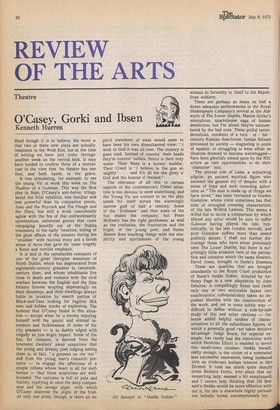REVIEW OF THE ARTS
Theatre
O'Casey, Gorki and Ibsen
Kenneth Hurren
Hard though it is to believe, the word is that two or three new plays are actually imminent in the West End, but at the time of writing we have just come through another week on the revival kick. It may have tended to confirm those of a morose cast in the view that he theatre has one foot, and both hands, in the grave.
It was stimulating, for example, to see the young Vic at work this week on The Shadow of a Gunman. This was the first play in Sean O'Casey's anti-heroic trilogy about the Irish rebellion, less fami.liar and less powerful than its companion pieces, Juno and the Paycoclz and The Plough and the Stars., but still a work consistently aglow with the fire of that extraordinarily spontaneous, untutored genius that came rampaging jauntily out of the Dublin tenements in the early 'twenties, telling of the glum affairs of the inmates during the ' troubles ' with raucous irony and a lavish sense of farce that gave the inner tragedy a fierce and terrible emphasis.
It is laid in the ramshackle. remnants of one of the great Georgian mansions of North Dublin, which has degenerated from :eighteenth-century grandeur to twentiethcentury slum, and whose inhabitants live close to death and violence with the civil warfare between the English and the Sinn Feiners forever erupting depressingly on their doorsteps, and their dwellings always liable to invasion by search parties of Black-and-Tans looking for fugitive IRA men and hidden stocks of explosives. The humour that O'Casey found in this situation — except when he :s merely enjoying himself with the quaint and eternal innocence and fecklessness of some of his city peasants — is as darkly edged with tragedy as you might expect. Some of the fun, for instance, is derived from the tenement dwellers' awed suspicions that the young and dreamy poet lodging among them is, in fact, "a gunman on the run" and from the young man's romantic pretence — to engage the affections of a simple colleen whose heart is all for such heroes — that these suspicions are wellfounded. The outcome is full of pain and futility, typifying at once the deep compassion and the savage anger with which O'Casey observed the alight of the Irish. At only one point, though, is there an ex
plicit statement of what would seem to have been his own disenchanted view: "I wish to God it was all over. The country is gone mad. Instead of countin' their beads they're countin' bullets. Petrol is their holy water. Their Mass is a burnin' buildin'. Their Creed is 'I believe in the gun almighty' . . . and it's all for the glory o' God and the honour o' Ireland."
The relevance of all this to certain aspects of the contemporary Ulster situation is too obvious to need underlining, and the Young Vic are content to let the play speak for itself across the alarmingly narrow gulf of half a century. Some of the Irishness ' and thus some of the fun eludes the company; but Peter McEnery has the right gentleness, as well as the confusion, the frustration and the fright, of the young poet, and Susan Sheers does touching things with the simplicity and spiritedness of the young woman so fervently in thrall to the Republican soldiery.
There are perhaps as many as half a dozen adequate performances in the Royal Shakespeare Company's revival at the Aldwych of The Lower Depths, Maxim Gorky's amorphous, quarrelsome saga of human dereliction; but I'm afraid they're outnumbered by the bad ones, These pitiful tatterdemalions, residents of a turn of the century Russian doss-house, human flotsam jettisoned by society — stagnating in pools of squalor, or struggling to keep afloat on illusions doomed to become waterlogged— have been gleefully siezed upon by the RSC actors as rare opportunities to do their ' character ' bits.
The pivotal role of Luka, a sojourning pilgrim, an ancient mystical figure who answers the general cry of despair with a moan of hope and such consoling aphorisms as "The soul is made up of things we have loved," has been entrusted to Gordon Gostelow, whose voice sometimes has that note of strangled crooning characteristic of the late Wilfrid Lawson. This seems a wilful bid to incite a comparison by which almost any actor would be sure to suffer (Lawson having played the role, hypnotically, in the last London revival), and poor Gostelow suffers more than seems: publicly decent. I shall not further discourage those who have never previously seen The Lower Depths, but there is surprisingly little evidence here of the perception and cohesion which the same director, David Jones, brought to Gorki's Enemies.
These are qualities that are brought abundantly to the Royal Court production of Ibsen's Hedda Gabler, directed by Anthony Page in a new adaptation by John Osborne. A compellingly fluent text (with only one or two noticeable lapses into anachronistic colloquialisms) takes no impudent liberties with the construction of the work, and yet in some subtle way — difficult to define without a side-by-side study of this and other versions — Osborne added helpful strokes of characterisation to all the subordinate figures, of which a generally good cast takes decisive advantage: Judge Brack, for especial example, has rarely had the conviction with which Denholm Elliott is enabled to invest this small-town cicisbeo. Hedda herself, oddly enough, is the victim of a somewhat less successful innovation, being lumbered With an irrelevant lesbian interest in Mrs Elvsted. It took me aback quite sharply (even Barbara Ferris, who plays that unsuspecting lady, seemed a bit nonplussed), and I cannot help thinking that Jill Bennett's Hedda would be more effective without it, for she is elsewhere highly persuasive: lethally bored, contemptuously icy.










































 Previous page
Previous page